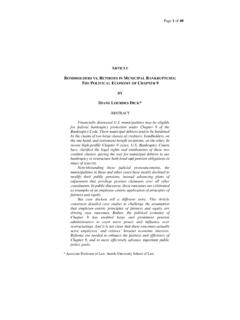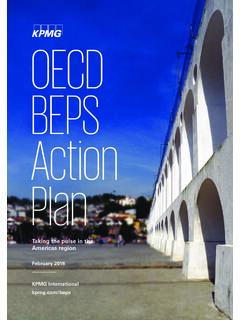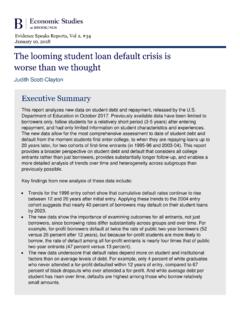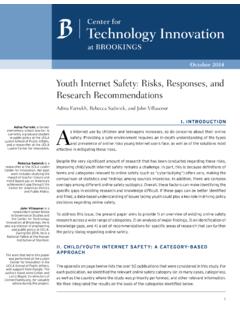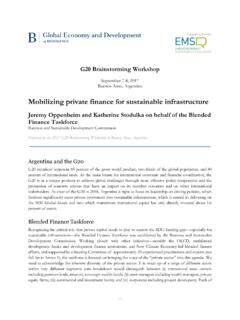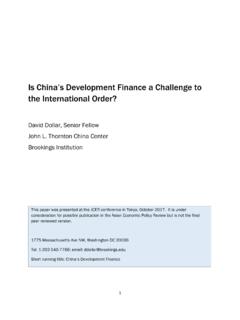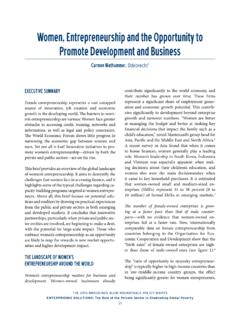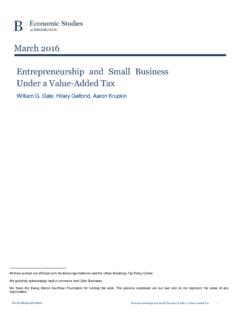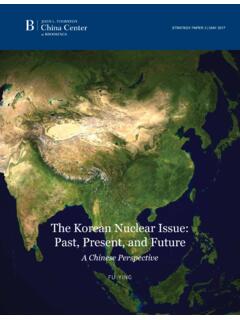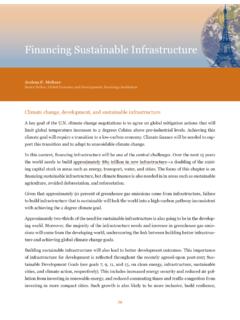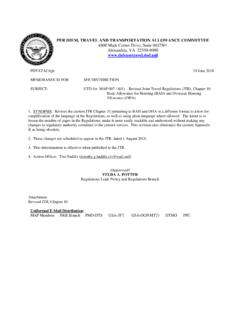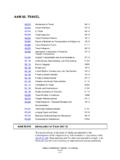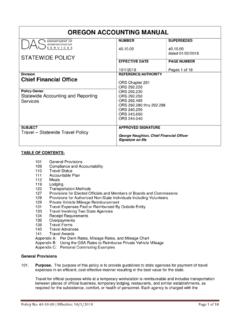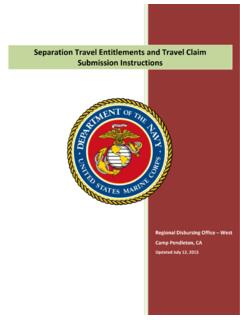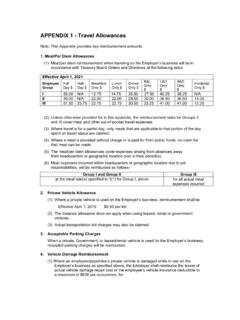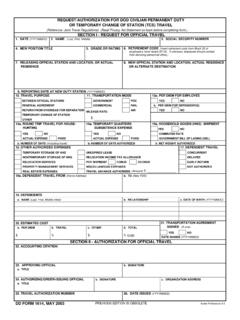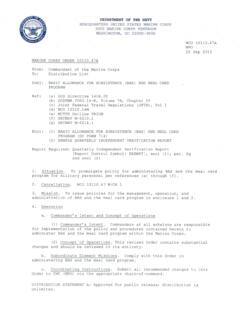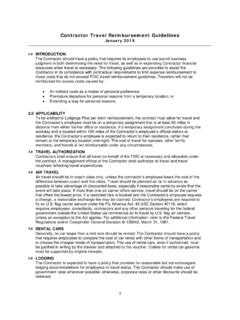Transcription of Travel and Business Expense Policy (OFS-3)
1 Travel and Business Expense Policy (OFS-3) Responsible Business Unit Office of Financial Services Responsible Officer Chief Financial Officer Effective Date March 1, 2014 Last Revision January 11, 2021 Summary This Policy applies to all employees and non-employees traveling for the purpose of conducting Business for the benefit of the Brookings Institution. This Policy outlines how employees and non-employees procure various Travel or Business -related goods or services, types of expenses that Brookings will reimburse, required documentation and the timing and procedures for submitting reimbursement requests. This Policy also adheres to good stewardship of our donor s funding. Policy Brookings participates in the Internal Revenue Service (IRS) accountable plan as it eliminates the need for employees to report reimbursements as income on their tax returns. The IRS outlines accountable plan rules are as follows: 1. expenses must have a Business connection incurred while performing services as an employee or affiliate of the Brookings Institution.
2 2. Travelers must adequately account for expenses and return any excess reimbursement/allowance within a reasonable period of time to their employer; 90 days per Brookings reimbursement timeframes and guidelines. All Travel and Business expenses must be authorized and approved by Brookings prior to any expenses being incurred. The traveler must consult with their project/program director and financial manager to obtain approval, including appropriate project and activity codes to charge. Travelers should always use the lowest priced transportation and lodging options that are reasonably available. This Policy was developed with the intent to cover the most common Travel -related situations but does not address every Travel -related situation. If a situation arises that is not covered by this Policy , the traveler should contact the Procurement department for guidance. Exceptions to this Policy may only be made with the approval of the CFO. Travel Arrangements It is strongly recommended that travelers use Concur for making all Travel arrangements, using a departmental or individual Brookings Procurement Card (Pcard).
3 The benefits of using Concur include: BROOKINGS Travel and Business Expense Policy Page | 2 Discounted airfare, hotel and car rental pricing 24-hour accessibility/emergency assistance throughout the world Easier Expense reporting Travel arrangements should be made as far in advance as possible, thereby allowing travelers to take advantage of the most inexpensive flights. Travelers may retain frequent flyer and hotel program benefits. Participation in these programs must not influence flight or hotel selections that would result in additional cost to Brookings beyond the lowest available airfare or hotel. Air Travel All air Travel must be in economy class. At the traveler s personal Expense , upgrades, above economy class, are allowable. First class air Travel is not allowed under Brookings Policy ; the CFO may pre-approve first class Travel on a case-by-case basis. Business class must be pre-approved by the program s Senior Financial Officer and only for the following situations: Non-continental or international air Travel , with a flying time exceeding 6 hours one-way.
4 For a documented medical condition. Requests must be forwarded for review and approval to the Director of Benefits in advance of purchase. If less expensive than an economy class ticket (full documentation will need to be submitted with Expense report showing that it was a lower fare). In the event of an extenuating circumstance, Business class tickets (for domestic or international Travel with a less than 6-hour Travel time) may be pre-approved by the CFO or Controller. Should an airline delay necessitate an overnight stay, the traveler should attempt to secure complimentary lodging from the airline. The ultimate responsibility for retrieving and compensating for lost baggage lies with the airlines. Brookings will not reimburse travelers for personal items lost while traveling on Business . Rail Travel First class rail Travel is not allowed. Acela should only be booked with pre-authorization from the SFO with reason documenting the Acela charge.
5 Rental Cars Travelers may rent a car to their destination when driving is more convenient and less expensive than airline or rail Travel , or it is necessary to transport equipment or materials. Travelers should make rental car reservations for an economy, compact or standard car through Concur. When there are three or more travelers, an upgraded car to accommodate the travelers may be procured. BROOKINGS Travel and Business Expense Policy Page | 3 Rental cars should be refueled before returning it to the agency to avoid gas surcharge fees. Travelers will be reimbursed for fuel purchased only, not on a per mileage basis. Travelers should purchase the additional car rental insurance offered through the rental company. Brookings provides additional coverage for travelers. Please contact the Procurement department for more information. Personal Vehicles Employees using their personal vehicles for Business are required to carry the minimum automobile insurance required in their state of residence.
6 Brookings reimburses mileage at the federal government rates. Travelers must provide their start and end location. Travelers will not be reimbursed for any parking or traffic violations. Travelers should exercise utmost care towards their safety as well as the safety of others, including following all federal, state, and local laws and regulations. While driving a personal or rental vehicle, travelers should avoid distractions, such as texting, using a handheld cell phone, and other activities that interfere with a driver's due care and attention. Travelers should also limit their use of hands-free devices for cell phones. Travelers traveling on Brookings's Business should always use the reasonable safety measures available to them, including but not limited to wearing their seatbelts. Lodging Travelers must reserve low cost, reasonable room rates as defined by the domestic and foreign lodging per diem rates. The lodging per diem rates are based on location of Travel and time of year.
7 Lodging per diem rate guidelines can be found at the following websites: Domestic (CONUS) Travel : GSA Website Domestic (non-CONUS) Travel : Department of Defense Foreign Travel : State Department For domestic Travel , if lodging is not available at the lodging per diem rate, travelers may procure lodging for up to $150 in addition to the published lodging per diem . For foreign Travel , travelers may only procure lodging up to the published lodging per diem rate. Lodging costs above the maximum allowable amount must be pre-approved by the SFO and include a documented reason for the exception. Before and during check-in, travelers should: Present a personal credit card or Brookings PCard for incidentals Provide a physical copy of the tax exemption form for all eligible states Use available hotel transportation to and from airports in lieu of rental cars or cabs when available BROOKINGS Travel and Business Expense Policy Page | 4 If travelers stay in a private residence while traveling on Business and if additional expenses are incurred to extend appreciation to friends or relatives for their hospitality, travelers may Expense up to $75.
8 Meals & Incidentals Employees travelling 50 miles or more from their official worksite are eligible for per diem . Employees will be reimbursed according to the federally published domestic (CONUS), domestic (Non-CONUS) or foreign per diem rates for meals and incidental expenses (M&IE) applicable for the city and dates of Travel . The M&IE per diem on the first and last day of Travel is 75 percent of the total M&IE rate. When another source provides a meal(s), per diem will be reduced accordingly. A traveler entitled to per diem may not receive reimbursement for a non- per diem meal unless it is Business related. For non-employees, please confirm eligibility for M&IE reimbursement with the program. Business Meals & Entertainment Business meals & entertainment are expenses incurred when a specific Business discussion takes place. IRS guidelines limit Business meals and entertainment expenses to situations where the expenditure "directly precedes, includes or follows a substantial and bona fide Business discussion for the purpose of obtaining income or other specific trade or Business benefit.
9 Travelers may request reimbursement for actual documented expenses . For Business meals that involves Brookings employees only, alcohol expenses will not be reimbursed. The traveler must provide the names of individuals present, their titles, affiliation, and the Business purpose of the meeting. In instances when the IRS guidelines are not met above, such as social occasions, these expenses are not classified as Business meals & entertainment and will not be reimbursed as such. Examples include social occasions, employee birthdays, employee morale events, and holiday or employee farewell parties. Reimbursement requests for these types of expenses should be coded to the program s Director s Account (73530). Additionally, these expenses should be charged to unrestricted funds. In some cases, these expenses may be charged to restricted grants, but SFOs should first consult with Accounting. Alcoholic Beverages If alcoholic beverages are consumed at a function at which Brookings can expect to derive a specific Business benefit and non-employees are present, reasonable costs will be reimbursed.
10 Alcoholic beverages consumed in route to a destination, in a hotel room, during functions not of a direct Business nature, or with employees only, will not be reimbursed as a Business Expense and are considered a personal Expense . If approved, this type of Expense will be coded to the Director s Account (73530). No alcohol may be charged to federal awards. BROOKINGS Travel and Business Expense Policy Page | 5 Travel Booked to Federal Awards All Travel booked to federal awards must comply with 2 CFR , this Policy , as well as any specific federal award contractual requirements. No Business class Travel may be booked to projects funded by federal awards except in limited exceptions as outlined in 2 CFR If one of the stated exceptions exists, the exception must be documented and approved in advance of ticket purchase by the traveler s Director of Finance and the Director of Grants and Contracts. For federal awards which specifically state that Business class is allowable, the request may be approved by the SFO.
